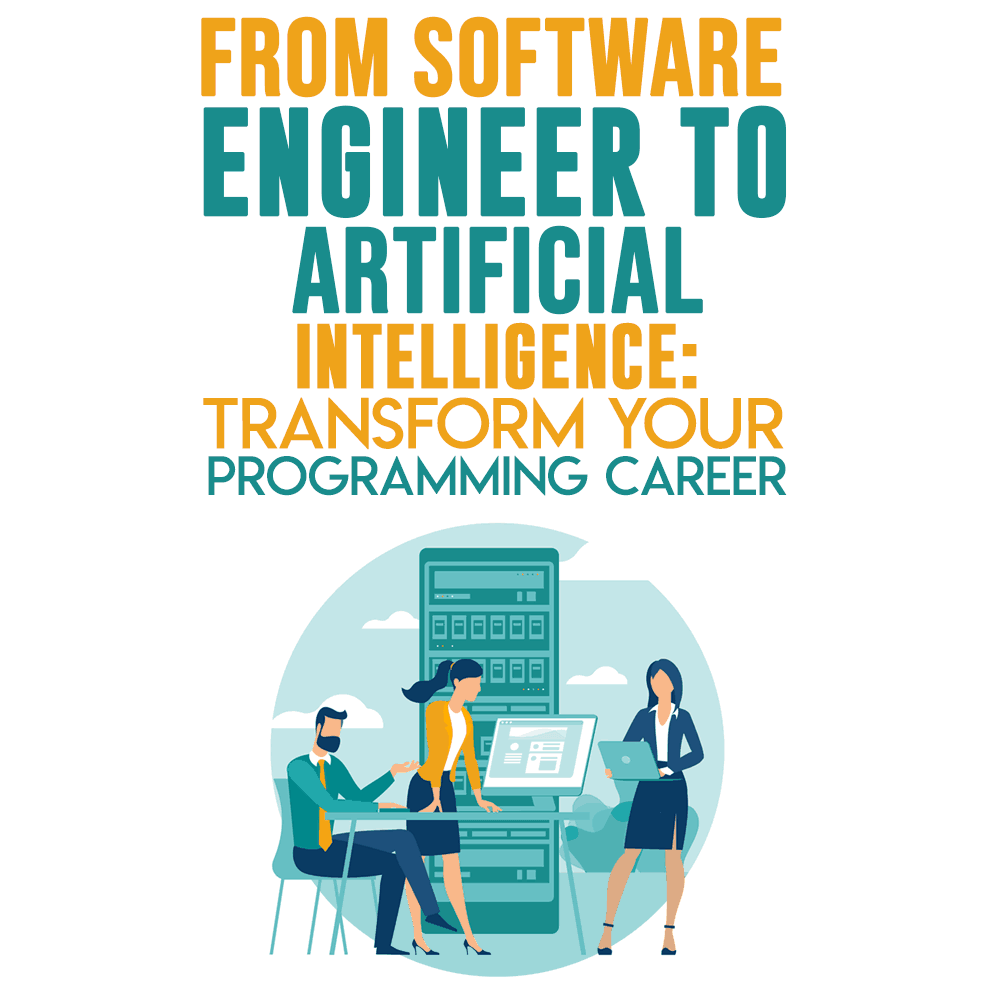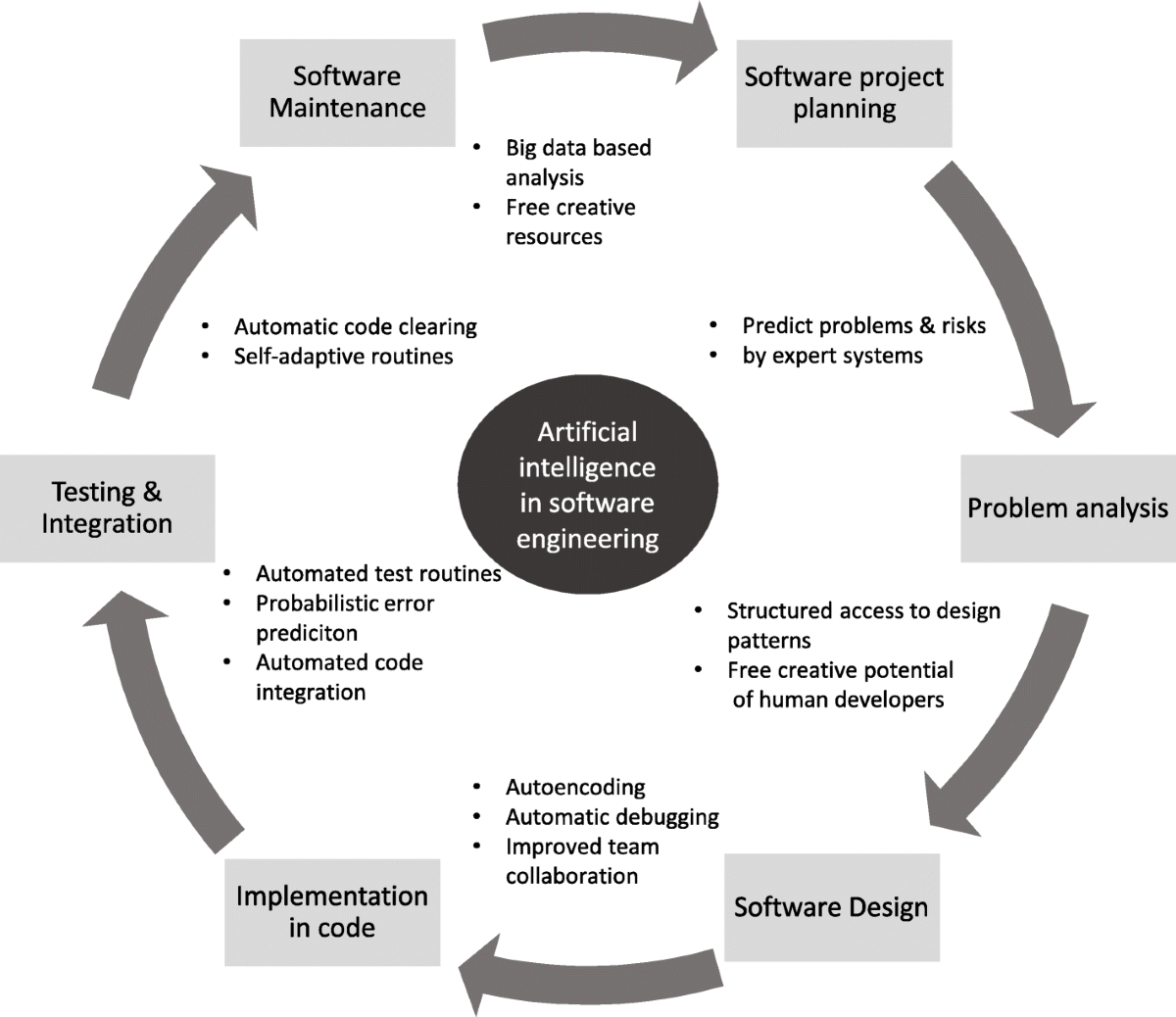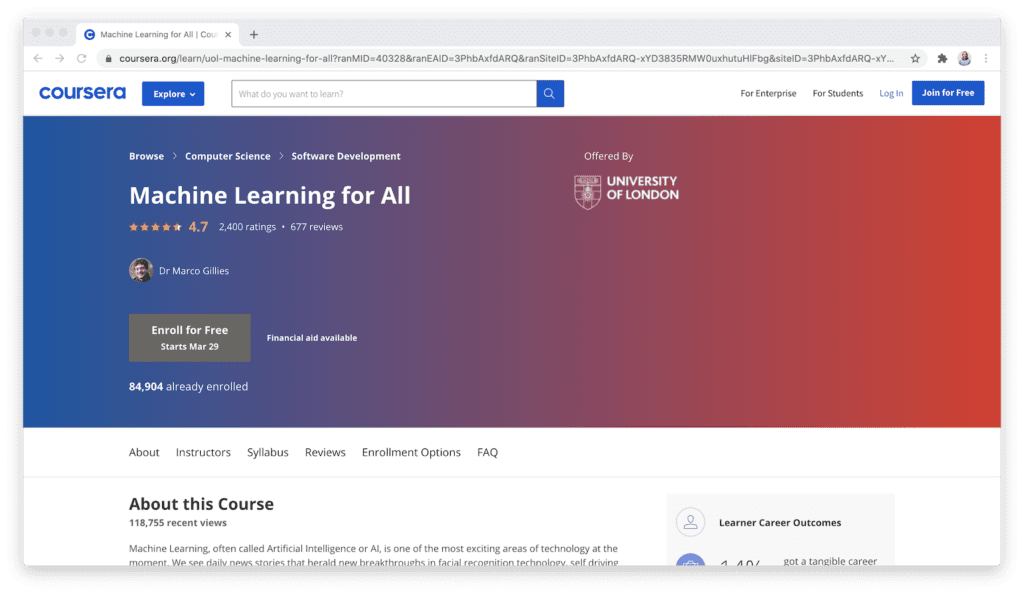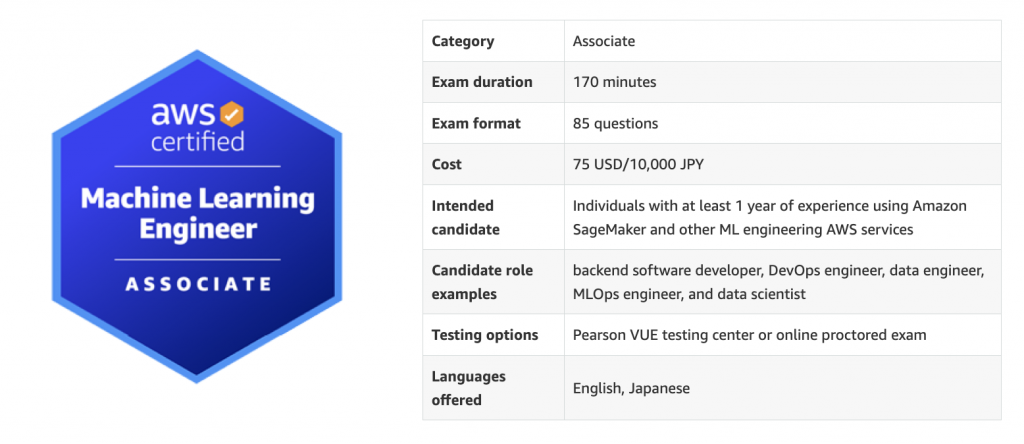All Categories
Featured
Table of Contents
- – 9 Easy Facts About Aws Machine Learning Engine...
- – Some Known Incorrect Statements About Software...
- – An Unbiased View of Best Online Software Engi...
- – Best Online Machine Learning Courses And Prog...
- – 7 Best Machine Learning Courses For 2025 (Re...
- – About 7-step Guide To Become A Machine Learn...
- – The smart Trick of Pursuing A Passion For Ma...
Some people believe that that's dishonesty. If someone else did it, I'm going to utilize what that individual did. I'm forcing myself to believe through the possible services.
Dig a little bit deeper in the math at the start, just so I can construct that foundation. Santiago: Finally, lesson number seven. I do not think that you have to recognize the nuts and screws of every algorithm prior to you use it.
I would certainly have to go and inspect back to really obtain a much better instinct. That does not imply that I can not address points utilizing neural networks? It goes back to our arranging instance I assume that's simply bullshit suggestions.
As a designer, I have actually worked with several, lots of systems and I have actually made use of several, numerous points that I do not comprehend the nuts and bolts of just how it functions, although I comprehend the effect that they have. That's the last lesson on that string. Alexey: The amusing thing is when I consider all these collections like Scikit-Learn the algorithms they make use of inside to execute, for instance, logistic regression or something else, are not the like the formulas we examine in maker knowing courses.
9 Easy Facts About Aws Machine Learning Engineer Nanodegree Described
So even if we attempted to learn to obtain all these fundamentals of device discovering, at the end, the algorithms that these collections utilize are different. ? (30:22) Santiago: Yeah, absolutely. I think we need a lot a lot more pragmatism in the sector. Make a whole lot even more of an influence. Or concentrating on supplying worth and a little bit less of purism.

I typically speak to those that want to function in the sector that want to have their effect there. I do not attempt to speak about that due to the fact that I don't know.
Right there outside, in the sector, materialism goes a long method for sure. Santiago: There you go, yeah. Alexey: It is an excellent inspirational speech.
Some Known Incorrect Statements About Software Engineering For Ai-enabled Systems (Se4ai)
One of the points I wanted to ask you. Initially, allow's cover a pair of things. Alexey: Let's begin with core devices and structures that you need to find out to actually transition.
I recognize Java. I recognize SQL. I know how to utilize Git. I understand Celebration. Perhaps I recognize Docker. All these things. And I read about artificial intelligence, it appears like a great thing. So, what are the core devices and frameworks? Yes, I enjoyed this video and I obtain persuaded that I don't require to obtain deep right into mathematics.
Santiago: Yeah, absolutely. I assume, number one, you need to start finding out a little bit of Python. Considering that you already recognize Java, I don't think it's going to be a massive change for you.
Not since Python is the very same as Java, yet in a week, you're gon na get a great deal of the distinctions there. You're gon na have the ability to make some progression. That's number one. (33:47) Santiago: Then you obtain particular core devices that are going to be used throughout your whole occupation.
An Unbiased View of Best Online Software Engineering Courses And Programs
That's a collection on Pandas for information manipulation. And Matplotlib and Seaborn and Plotly. Those three, or one of those three, for charting and showing graphics. Then you obtain SciKit Learn for the collection of artificial intelligence algorithms. Those are devices that you're going to have to be making use of. I do not suggest just going and finding out about them unexpectedly.
Take one of those programs that are going to start presenting you to some troubles and to some core concepts of equipment discovering. I do not bear in mind the name, yet if you go to Kaggle, they have tutorials there for cost-free.
What's good concerning it is that the only demand for you is to know Python. They're mosting likely to present a problem and tell you just how to make use of choice trees to fix that details problem. I believe that process is very powerful, since you go from no maker learning history, to understanding what the trouble is and why you can not solve it with what you understand right currently, which is straight software design techniques.
Best Online Machine Learning Courses And Programs Fundamentals Explained
On the various other hand, ML designers focus on building and releasing device knowing models. They concentrate on training designs with information to make forecasts or automate tasks. While there is overlap, AI designers deal with more diverse AI applications, while ML engineers have a narrower emphasis on artificial intelligence algorithms and their sensible execution.

Artificial intelligence engineers concentrate on developing and releasing artificial intelligence versions right into manufacturing systems. They function on design, making certain versions are scalable, efficient, and integrated right into applications. On the other hand, data researchers have a wider duty that includes information collection, cleansing, expedition, and building designs. They are usually in charge of drawing out insights and making data-driven choices.
As organizations increasingly take on AI and equipment understanding technologies, the need for skilled professionals expands. Equipment knowing designers work on sophisticated projects, contribute to development, and have competitive incomes.
ML is fundamentally different from conventional software program growth as it concentrates on mentor computers to find out from information, instead of programming specific guidelines that are implemented methodically. Uncertainty of results: You are most likely used to composing code with foreseeable outputs, whether your function runs once or a thousand times. In ML, nonetheless, the results are much less specific.

Pre-training and fine-tuning: How these designs are educated on large datasets and afterwards fine-tuned for particular tasks. Applications of LLMs: Such as message generation, sentiment analysis and info search and access. Documents like "Attention is All You Need" by Vaswani et al., which introduced transformers. Online tutorials and training courses concentrating on NLP and transformers, such as the Hugging Face course on transformers.
7 Best Machine Learning Courses For 2025 (Read This First) Things To Know Before You Buy
The capability to take care of codebases, merge changes, and fix conflicts is just as important in ML advancement as it remains in traditional software tasks. The skills developed in debugging and screening software application applications are extremely transferable. While the context could alter from debugging application logic to determining problems in data processing or design training the underlying principles of systematic investigation, theory testing, and repetitive refinement are the exact same.
Machine discovering, at its core, is greatly reliant on stats and chance theory. These are essential for recognizing how algorithms pick up from information, make predictions, and review their efficiency. You should take into consideration coming to be comfortable with concepts like analytical significance, distributions, hypothesis testing, and Bayesian reasoning in order to style and analyze versions effectively.
For those thinking about LLMs, a thorough understanding of deep understanding designs is useful. This includes not only the auto mechanics of neural networks but likewise the architecture of particular versions for different use situations, like CNNs (Convolutional Neural Networks) for picture processing and RNNs (Frequent Neural Networks) and transformers for consecutive data and natural language processing.
You must know these concerns and discover methods for determining, minimizing, and connecting concerning bias in ML models. This consists of the prospective impact of automated choices and the moral implications. Several versions, specifically LLMs, call for substantial computational sources that are often given by cloud platforms like AWS, Google Cloud, and Azure.
Structure these skills will not only facilitate an effective shift right into ML but likewise guarantee that developers can contribute effectively and sensibly to the improvement of this vibrant area. Theory is essential, yet nothing defeats hands-on experience. Begin functioning on projects that permit you to use what you've discovered in a functional context.
Develop your jobs: Start with basic applications, such as a chatbot or a message summarization tool, and progressively raise complexity. The field of ML and LLMs is quickly evolving, with new innovations and modern technologies emerging on a regular basis.
About 7-step Guide To Become A Machine Learning Engineer In ...
Join areas and online forums, such as Reddit's r/MachineLearning or area Slack networks, to talk about ideas and obtain recommendations. Go to workshops, meetups, and seminars to connect with various other experts in the field. Contribute to open-source tasks or create article concerning your understanding trip and projects. As you obtain expertise, begin searching for chances to incorporate ML and LLMs right into your job, or seek brand-new functions concentrated on these innovations.

Prospective usage cases in interactive software, such as suggestion systems and automated decision-making. Recognizing unpredictability, standard statistical measures, and likelihood distributions. Vectors, matrices, and their function in ML formulas. Error reduction techniques and gradient descent clarified simply. Terms like model, dataset, functions, labels, training, reasoning, and validation. Information collection, preprocessing methods, design training, evaluation processes, and release factors to consider.
Choice Trees and Random Woodlands: Instinctive and interpretable models. Assistance Vector Machines: Maximum margin category. Matching trouble kinds with proper designs. Balancing efficiency and complexity. Standard framework of semantic networks: nerve cells, layers, activation features. Layered calculation and onward propagation. Feedforward Networks, Convolutional Neural Networks (CNNs), Recurrent Neural Networks (RNNs). Image acknowledgment, series prediction, and time-series evaluation.
Continuous Integration/Continuous Deployment (CI/CD) for ML operations. Design monitoring, versioning, and efficiency monitoring. Finding and resolving modifications in version efficiency over time.
The smart Trick of Pursuing A Passion For Machine Learning That Nobody is Talking About

You'll be introduced to three of the most relevant elements of the AI/ML technique; supervised discovering, neural networks, and deep learning. You'll comprehend the distinctions between traditional shows and machine knowing by hands-on advancement in supervised discovering prior to developing out complicated distributed applications with neural networks.
This training course offers as a guide to device lear ... Program Much more.
Table of Contents
- – 9 Easy Facts About Aws Machine Learning Engine...
- – Some Known Incorrect Statements About Software...
- – An Unbiased View of Best Online Software Engi...
- – Best Online Machine Learning Courses And Prog...
- – 7 Best Machine Learning Courses For 2025 (Re...
- – About 7-step Guide To Become A Machine Learn...
- – The smart Trick of Pursuing A Passion For Ma...
Latest Posts
How To Prepare For An Engineering Manager Interview – The Best Strategy
The Google Software Engineer Interview Process – A Complete Breakdown
The Best Open-source Resources For Data Engineering Interview Preparation
More
Latest Posts
How To Prepare For An Engineering Manager Interview – The Best Strategy
The Google Software Engineer Interview Process – A Complete Breakdown
The Best Open-source Resources For Data Engineering Interview Preparation